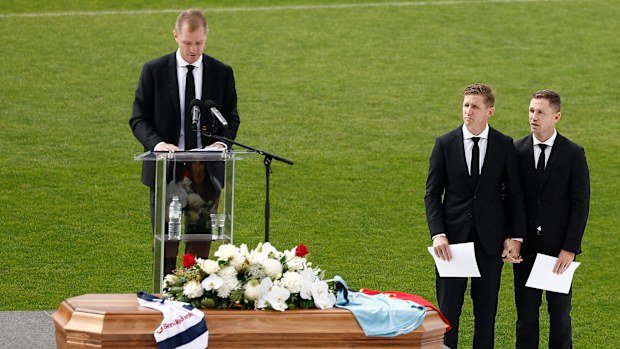Paul Roos has voiced his support for the AFL to establish a mental health round, stating that the league should not wait for another tragedy to prompt action. He emphasised that players have the ability to dismantle the stigma attached to mental health by advocating for this initiative.
However, the former Swans premiership coach commended the AFL, its clubs, and the AFL Players Association for the effective work they do in the realm of mental health.
“What’s concerning is that if they are indeed doing a really good job and suicides continue to occur, there’s still a significant journey ahead of us,” Roos expressed in an interview with Wide World of Sports.
The urgency for a dedicated mental health round in the AFL has intensified following the tragic passing of Adam Selwood, a member of West Coast’s 2006 premiership squad, at the age of only 41 on Saturday. His death, which is not deemed suspicious, came just three months after his identical twin brother, Troy Selwood, formerly a Brisbane Lion, also took his own life in February.
The rallying cry for a mental health round is being championed by Wayne Schwass, who was part of North Melbourne’s 1996 grand final-winning team and later played alongside Roos at Sydney. Schwass has founded an organisation called PukaUp, which focuses on preventing suicide through education and fostering open conversations.

Adam Selwood addresses attendees at the funeral of his twin brother, Troy, in February, flanked by brothers Scott (left) and Joel. AFL Photos via Getty Images
“Implementing a mental health round can only be beneficial. It’s a step we can take without any negative consequence,” Roos noted.
“We cannot afford to wait for tragedies to occur. We need to establish systems to prevent such occurrences and address the issues proactively. It often seems that there’s a reactive approach when something adverse occurs.”
“When players openly share their experiences regarding mental health, it normalises the discussion. Athletes can lead by example. By creating a mental health round, it sets a precedent for lower grades in football and beyond. I wholeheartedly support this idea.
“Players serve as role models, whether they intend to or not, as high-performing athletes across all sports are often viewed in that light,” Roos added.
“Thus, if the AFL and its players endorse a mental health round and engage in conversations about it, it will undoubtedly help. There’s no doubt about that.”
The AFL Players Association stated in their response to Adam Selwood’s passing that they provide “free and confidential support nationwide to all current and former player members, along with their partners.”

Paul Roos in 2005, during his tenure as coach of Sydney. Getty
In response to inquiries from Wide World of Sports, the AFL indicated that it employs a team of 37 professionals dedicated to supporting players in talent pathways, alongside specialists focused on addressing the root causes of mental health issues across the industry.
The league also highlighted that every player has direct access to a club psychologist, with the ability to seek assistance from a specialist whenever necessary, fully funded by the AFL. Furthermore, there are financial concessions available for mental health expenditures.
Moreover, the AFL has established an Indigenous psychologists network, aimed at providing culturally sensitive mental health care for First Nations players.
While the AFL does not currently have a designated mental health round, it noted that St Kilda annually highlights mental health awareness through Spud’s Game, which honours Danny Frawley, who tragically took his own life in 2019.
Roos, who played 356 games for Fitzroy and Sydney during the 1980s and 1990s—a period marked by the game’s increasing professionalism—has since coached the Swans and the Demons, witnessing the league’s continual evolution in terms of mental health support.
“In my experience, with the presence of sports psychologists at clubs, dedicated assistant coaches, leadership groups, and the ongoing training from the AFL, along with the support from the AFLPA, the environment is quite positive overall,” Roos observed.
“The real concern is that if the AFL environment is indeed supportive, yet players are still facing struggles, it’s alarming to consider the state of those in less supportive conditions.”
“The AFL provides a commendable environment—just imagine what it would feel like in a negative space.”
The mental health crisis has been further highlighted this year, not only by the tragic losses of Troy and Adam Selwood but also due to several players taking personal leave, adding complexity to the ongoing issue.
Among those who have taken time off are Carlton’s Elijah Hollands and Harry McKay, along with Jamarra Ugle-Hagan from the Western Bulldogs, who recently sought refuge at a health retreat, a decision that received widespread applause.
Notably, some of the greatest AFL players, including Lance Franklin in 2015, have previously taken mental health leave, emphasising the reality that mental health struggles can affect anyone.
“Ultimately, we want to prevent further tragedies and the loss of lives to suicide. That is our primary goal,” Roos concluded.
If you or someone you know is in need of immediate support, please reach out to Lifeline at 13 11 14 or visit lifeline.org.au. In case of an emergency, call 000.
Compiled by SportArena.com.au.
Fanpage: SportArena.com.au.
LiveScore – Live Sports Results & Odds.




